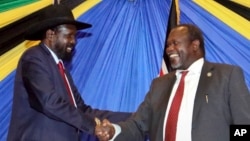Talks on South Sudan's future, mediated by the East African group of nations known as the Intergovernmental Authority on Development, ended without agreement Thursday, further postponing a deal to end more than a year of fighting in the country.
Speaking to VOA after a closed-door session with heads of state, South Sudan opposition leader Riek Machar said several key issues continued to stand in the way. He specficially listed "the structure of government, the power-sharing issues, the constitution and national assembly."
While the rival sides have agreed in principle to establish a transitional government, they have yet to reach consensus on the distribution of power.
Foreign Minister Barnaba Marial Benjamin, on the side of the government, denied any vast disagreements existed and said there had been positive developments in recent talks.
“There are no major obstacles," he said, adding that "peace cannot be negotiated in hours. So there are issues that need to be worked out and clarified.”
The IGAD heads of state are to meet again Saturday to continue work on a peace deal.
Conflict broke out in South Sudan in December 2013 when a power struggle within the ruling party pitted factions of the armed forces and allied militias against each other. The violence has left tens of thousands of people dead and has displaced more than 1 million.
The warring sides have signed several cease-fire agreements, the first one over a year ago, but all have been almost immediately violated.
Beny Gideon Mabor with the South Sudan Law Society said that despite past failures in the peace process, with enough pressure, the current round could yield results.
“There is this issue of sanctions, which is clearly on board," he said. "There is this issue of the African Union commission of inquiry report, which apparently will implicate heavy political and military figures on both sides. So these are clear threats if parties fail to reach an agreement.”
The AU inquiry report being presented to the Peace and Security Council has allegedly documented abuses committed during the conflict in South Sudan. But the text has been kept confidential, despite calls from civil society and rights groups for the report to be made public.
IGAD has threatened to impose sanctions against the parties to the violence, but it has not taken action.




